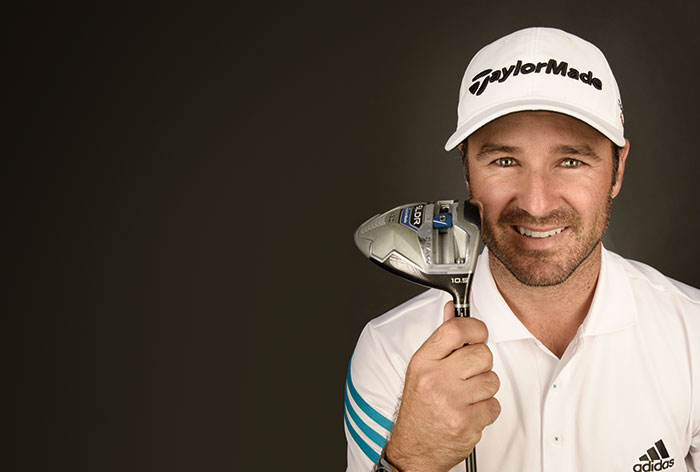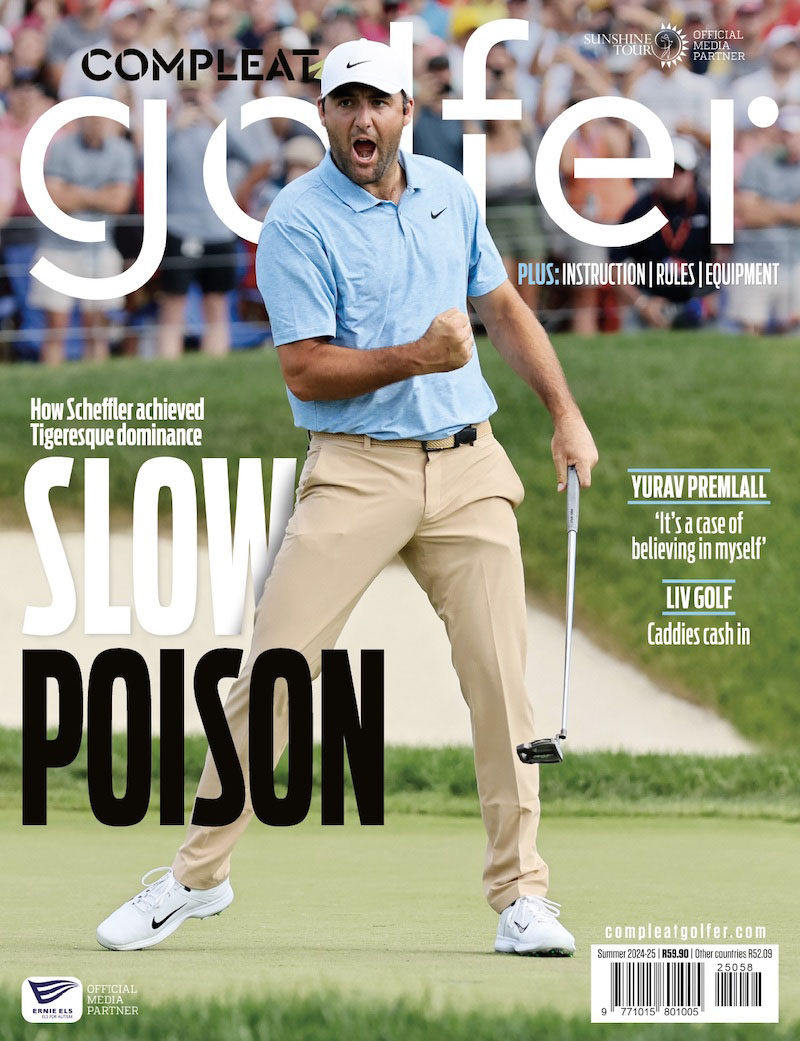This year, Trevor Immelman will pick himself up again. He will continue trying to find a way back in the game he loves. He will do what he does better than winning The Masters, and that’s to just keep moving forward. This year, Trevor Immelman will try again, writes Michael Vlismas.
From his position of 1 601st on the World Ranking, Immelman has decided to find a new way. It’s something he’s been doing since 2008, when he won The Masters and the golf world was at his feet and then a run of injuries led to bad technique, a loss of form and ultimately a loss of confidence.
When Immelman won his first professional tournament, the Tusker Kenyan Open on the European Challenge Tour in 2000, the player who finished second that week, four shots behind, was Henrik Stenson.
Before he had turned 30, Immelman had won a Major, a regular PGA Tour event (beating Tiger Woods into second place in both), two SA Opens and a handful of other tour events.
There is no doubt Immelman was a golf prodigy. But after he won The Masters, he came crashing down from that high.
If Homer was in the press centre these days, he’d probably liken Immelman to the Odysseus of golf. Destined to wander after a great conquest. It’s a journey that brought him back to South Africa at the beginning of this year, when he returned to play in the European Tour co-sanctioned events on these fairways.
With Honorary Life membership on the European Tour, Immelman will divide his time between this tour and the limited starts he has on the PGA Tour as he seeks to regain his form and confidence.
In five tournaments on the European Tour this season Immelman made the cut in one, the Qatar Masters, where he finished tied 52nd with only one sub-70 round. That 68 was the only sub-70 round in the 12 he played on the European Tour in January and February.
It’s not that he’s not playing well. It’s that he’s not yet playing well in tournaments.
Speaking during the Abu Dhabi Invitational Charity Pro-Am in January, Immelman said: ‘I’ve started playing some better golf. Obviously not quite as good as I would like but I am working on it and it does feel like I’m headed in the right direction. Hopefully I can get things going.’
From his base in America where he coaches and works as a commentator on the PGA Tour, Immelman’s older brother Mark believes without a doubt that the young boy who he identified early on as having a swing to win Majors will make it back to the highest level of the game.
‘Maybe I believe more than what he might that he can still win at the highest level. He has all the tools. It’s just a question of delivering them when the chips are down.
‘He’s playing well in practice so he knows all the bits and pieces are there. He knows he’s won at the highest level. It’s a question of just allowing it all to come together. There’s that level of patience required too. He’ll be back, of that I’m convinced, just because he knows he can do it. And he’s completely committed to what’s required to get back to the top of his game.’
So this year Immelman will try again. The pure resilience he has shown makes what he did at The Masters pale in comparison. How long he will continue to fight is anybody’s guess. It could be one more season, it could be another 10.
Immelman has the luxury of a sizeable bank balance to rest easy on. But when the competitive fire is lit as early as five years old, it never was about the money.
‘There’s no doubt that just to play at the highest level and win big events around the world you have to be mentally strong to start with as you battle adversity and so on,’ says Mark.
‘Trevor learned a lot from The Masters victory where Gary Player told him it wasn’t going to be plain sailing in the final round and that there would be challenges, but that he just had to battle his way through those. And he did. So there was a learning curve in that.
‘But with Trevor it’s more than just resilience. It’s also having a proper outlook on life. You could quite easily, if you are in his position, complain, “Why me?” But you’ve just got to say, “This is my career course. This is the path I’m on. I’m going to keep a positive attitude and keep working”. It’s very easy in Trevor’s position to feel, “Oh, woe is me”. Then you’ve lost it completely.”
When you consider his injuries, Immelman has every right to feel aggrieved.
In 2007 he suffered a stomach virus that stripped him of his weight. That year he also had to withdraw from the South African Open to have surgery to remove a benign tumour from his rib area.
Then in 2008 Immelman began struggling with severe pain in his wrist. He also had shoulder trouble and back issues.
‘I started feeling the pain right in my transition. I felt as though I could play my way through it by taking anti-inflammatories and painkillers. But it just got to a point where I was having a hard time grabbing on to the club and putting any actual force on to the grip,’ he said.
‘So I got to a point where I was almost flinching through impact and that’s where it started getting ugly for me. I went to see a specialist in Orlando and it seems I had three things going on in there. I had a cyst, I had some tendon issues and I had some torn cartilage. I also needed a couple of injections to get rid of all the inflammation around the tendon and then I was just rehabbing, which was not fun.’
The decision to try to play through his injuries for as long as he did is something Immelman understands his reasons for, but which he now regrets. ‘By the end of the summer in 2009 it was brutal. The pain was unbearable, and pain medication can only go so far.’
He eventually elected for surgery to his wrist. But the damage to his swing was far more long term.
‘I’d started compensating for the pain and I got into some bad technical habits with my swing. The pain was brutal. There were times I’d be at the top of my backswing and my brain wouldn’t let me hit the ball because I was just anticipating the pain. I decided to have surgery, was out for five or six months, then had to go through rehabilitation. So for about two and a half years I was just floating around being frustrated. You lose your confidence because you’re not competing like you used to, so you slip back even further.’
Speaking to Mark on his radio show and during a discussion on injuries in golf, Trevor admitted how tough the game had been on his body.
‘I think the game has taken a toll on today’s players physically because we had to adjust to what was going on with the equipment. Players from generations before us were playing with equipment that probably wasn’t as high quality and therefore they couldn’t make as aggressive a pass at the ball. It was much more of rhythm, finesse and timing. Now, when I’m standing over a drive, for the most part I’m just trying to hit it as far as I can.
‘In my career I placed far too much emphasis on the upper body and probably not enough on the lower body, from a working out and technique standpoint. You see the guys on Tour now hitting the ball so far and accurate, and they may be short or tall but they have one thing in common – big legs. It’s a tremendous power source.’
Mark is in complete agreement that golf is now more physically demanding than it has ever been.
‘Today’s players are exerting more energy as the game gets longer. The joints take a greater pounding. To protect the body it’s become a necessity to work out and be in good shape. The game is definitely more taxing physically. Just the way the golfers look tells you that. Golfers used to be five foot nine or five foot ten. Now the average size on the PGA Tour is like six foot two. They are well-built, athletic guys.’
As much as he has kept grinding away at the problem, Immelman has not been immune to thoughts of quitting.
‘If you grow up competing at a high level it’s very hard when you suddenly can’t go out there and do that. You can’t practise the way you would like to. That part mentally can be a real challenge. You’ve got to be tough and patient, hang in there, and make your way through it.
‘But there was a point when I said to my wife, Carminita, “Maybe I just need to accept I had a nice run for a few years and that was that”.’
What pulled him back from that brink was seeing his then seven-year-old son Jacob start to take pleasure in sport. And it reminded him that his career was something to keep fighting for.
So this year Trevor Immelman will get up once again. He’ll do so for his children’s sake.
‘The one thing surgery taught me was never to think too far ahead. You can’t take things for granted and expect things to happen. Since then I’ve just been trying to enjoy every day, take everything in my stride, live every moment and do as well as I can and enjoy everything as much as I can. I want my kids to see that you work hard and you make sacrifices, but you always have to get ready for that next day.’








